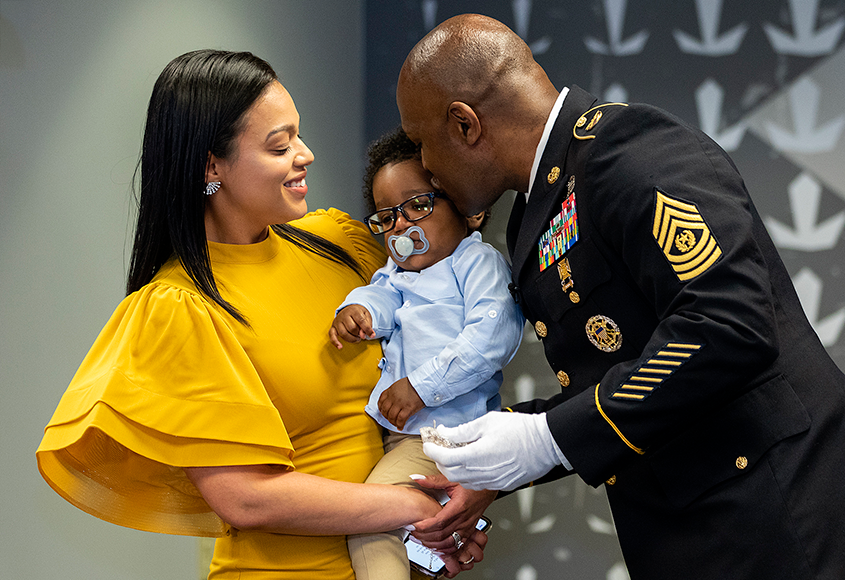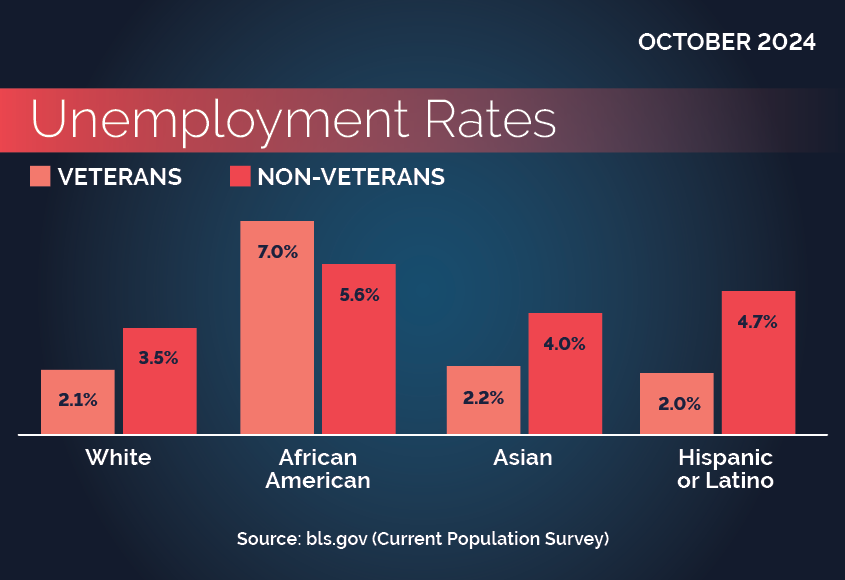Equally valued. Equally qualified. Equally served.
In fiscal year 2023, VETS launched the Black Veterans Research Project as part of the agency’s broader efforts to support diversity, equity, inclusion, and accessibility. Black veterans have historically been underrepresented in research. Additionally, Black veterans, who make up 14% of veterans and less than 8% of the total Black population (bls.gov), disproportionately access assistance and support programs, while experiencing worse economic and employment outcomes than other veteran subgroups.
The Black Veterans Research page documents Black veterans’ experience transitioning from military to civilian employment and identifies research gaps that prevent the current state and needs of Black veterans from being fully understood.
The purpose of Black Veterans Research
- Build evidence and inform policy decisions.
- Share data with stakeholders.
- Make statistical analyses and other research easily accessible.

Unemployment Rates By Race, Hispanic Ethnicity and Veteran Status

October 2024
White Veterans 2.1%
White Nonveterans 3.5%
Black Veterans 7.0%
Black Nonveterans 5.6%
Asian Veterans 2.2%
Asian Nonveterans 4.0%
Hispanic or Latino Veterans 2.0%
Hispanic or Latino Nonveterans 4.7%
Black Veterans and Employment: A Literature Review
The U.S. Department of Labor’s (DOL) Veterans’ Employment and Training Service (VETS), in partnership with DOL’s Chief Evaluation Office (CEO) conducted a literature review to synthesize research findings on Black veteran labor force participation, barriers to employment, exemplar interventions, and employment needs.
Key findings
- Black veterans are not a monolithic group.
- Black military members are disproportionately discharged with statuses of “other than Honorable” and “General.”
- Nonveterans overall had higher unemployment rates than veterans, but both Black nonveterans and Black veterans had the highest unemployment rates among their respective data cohorts.
- Black veterans disproportionately experience incarceration and homelessness.
- Black veterans have less social capital than other veteran subpopulations.
- More comprehensive analyses need to be conducted to fully understand the economic, employment, and social challenges Black veterans face.
Research Roundtable: Commemoration of the 75th Anniversary of the Desegregation of the Armed Forces
The significance of desegregation of the U.S. Armed Forces
In session one, veterans and practitioners discussed the significance of the desegregation of the U.S. Armed Forces, its impact on civil rights movements, progress made toward equality in the military, and Black veterans’ access to good jobs.
Employment barriers and expanding opportunities
In session two, panelists shared the latest research findings on Black veteran employment barriers, outcomes, and opportunities, as well as real-world examples of how practitioners are using data to address barriers and expand opportunities for Black veterans.
- Download the Session Two program (PDF)
- Watch the recording (YouTube)
- Download the session slides (PDF)
Services and interventions that work
In session three, panelists presented current information on what works to best support Black veterans’ career success. Researchers and practitioners shared information on the effectiveness of different services and interventions, while also identifying gaps and opportunities for future research.

In July 2023, the Veterans’ Employment and Training Service (VETS) partnered with the Chief Evaluation Office (CEO) and the Chief Diversity and Equity Office (CDEO) to host the U.S. Department of Labor Commemoration of the 75th Anniversary of the Desegregation of the Armed Forces.
This three-part roundtable series highlighted subject matter experts as they discussed barriers to Black veteran employment, services, and how to best support Black veterans’ employment outcomes.

